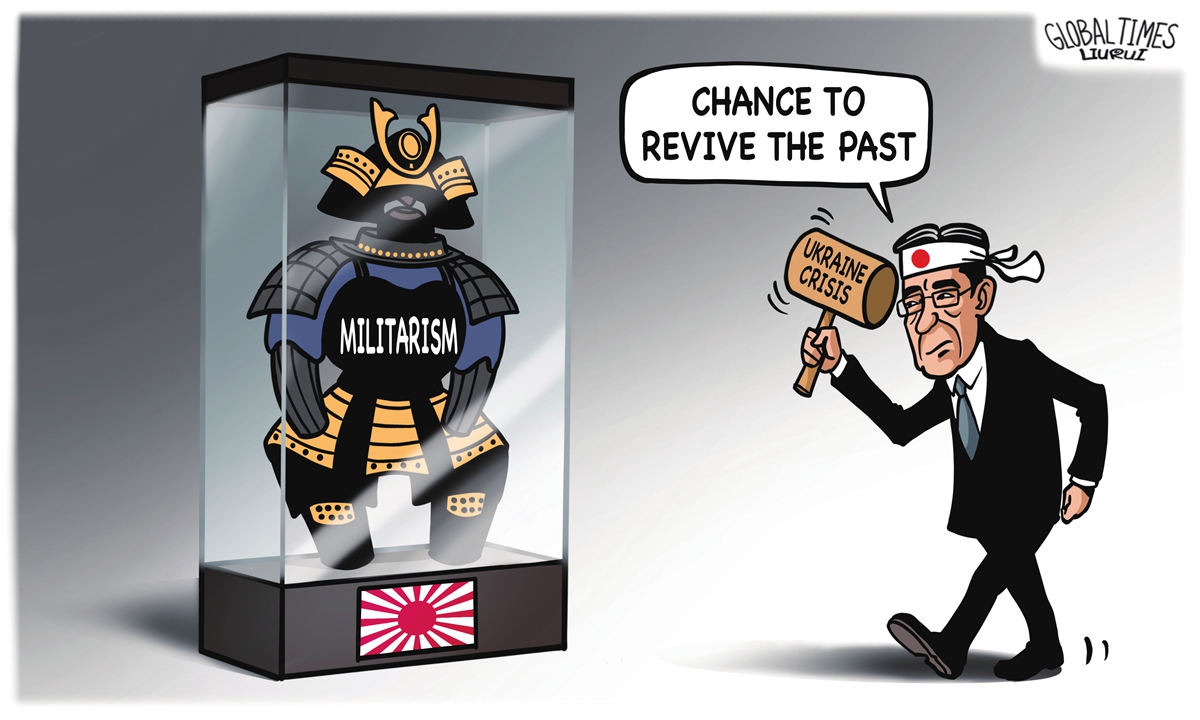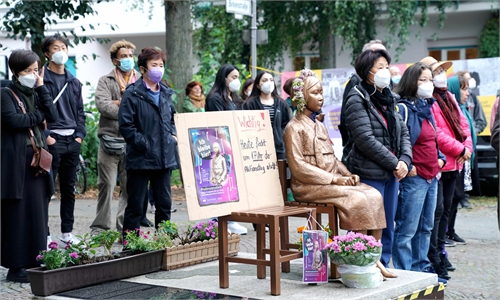
An excuse to militarize Illustration: Liu Rui/GT
Click here to stay tuned with our live updates on Ukraine tensions.Japan imposed another round of sanctions against Russia, adding to earlier sanctions against Russian president and some Russian top officials. The island nation also restricted economic and financial cooperation. Accordingly, Moscow included Tokyo on its list of unfriendly countries.
This development isn't unexpected but is still disappointing. Some observers were hopeful that Japan would continue its strategic autonomy to maintain balance between major countries. However, Japan shamelessly surrendered its strategic autonomy to the US once and for all. It had already done so regarding relations with China.
Japan had previously tried to resolve what Tokyo considers the so-called Northern Territories dispute, which Russia refers to as Kuril Islands dispute. They haven't yet signed a peace treaty due to the US' meddling, which has hamstrung their relations across the past seven decades. Former prime minister Shinzo Abe tried to reach an agreement with President Vladimir Putin during his tenure to no avail.
His successors don't seem sincerely interested in continuing his related attempts, otherwise they wouldn't have complied with their American patron's regional demands, including against Russia. Imposing several rounds of sanctions resulted in Russia regarding Japan as an unfriendly country. There's now no realistic chance of the two signing a peace treaty anytime soon, or resolving their disagreement over the outcome of World War II.
Russian-Japanese relations will remain tense for the foreseeable future, with Japan's American patron likely exacerbating the situation to serve its regional divide-and-rule agenda. By pitting Tokyo against Moscow, Washington is employing fear-mongering over the so-called Russian threat in order to convince the Japanese population to support their government's illegal militarization.
Japan is prohibited from undertaking a vast range of military actions due to its official status as one of World War II's aggressor states, yet that hasn't stopped Tokyo from devising workarounds to evade its international legal responsibilities, with Washington's full support. The US envisions Japan as its "unsinkable aircraft carrier", as many American experts have described, with the intent to exploit a platform to threaten China and Russia's security.
Japan's American-backed regional hostility against its neighbors in recent years prompts credible concern that the country is reverting to its former fascist ways, which can't help but incentivize those who've been victimized to consider means for ensuring their security.
Russia plans to host its first International Anti-Fascist Conference in August. Details about this event are scarce, but it's possible that Japan's de facto American-encouraged reversion to fascism might become part of the participants' discussions.
The irony is that while Japan independently waged World War II in Asia, this time it's risking World War III at the behest of its American patron. It risks repeating history if it engages in regional aggression again. By surrendering its strategic autonomy to the US, Japan is willingly making itself a servant of the declining unipolar hegemon, essentially turning into its senior partner's mercenary.
The Japanese people must urgently understand how dangerous their government's decisions are, both with respect to provoking China and Russia as well as reverting back to its fascist ways by continuing to illegally militarize with full American support. Japan could have played the role of a regional balancer by remaining neutral like India. Instead, this East Asian member of the Quad opted to surrender its strategic autonomy without getting anything in exchange.
East Asia isn't threatened by China, Russia, or the Democratic People's Republic of Korea, but is increasingly threatened by Japan. Considering this region's global importance, it can therefore be concluded that Japan is fast becoming a threat.
The author is a Moscow-based American political analyst. opinion@globaltimes.com.cn

